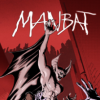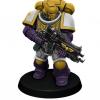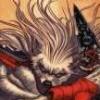-
Posts
3097 -
Joined
-
Last visited
About Dark Apostle Thirst

Retained
- ++ DISCIPULUS GRADIOR ++
Recent Profile Visitors
Dark Apostle Thirst's Achievements
-

IA : Mercurial Lords
Dark Apostle Thirst replied to Dark Apostle Thirst's topic in + LIBER ASTARTES +
Two months later? Let's go. Organization The Mercurial Lords, though devoted to their Primarch and the greater brotherhood of the Ultramarines and their fellow successors, are only mostly Codex compliant. The chapter nominally fields the full chapter of Space Marines as normally instructed by the Codex Astartes, with two minor but significant exceptions. Firstly, and most importantly, promising officers with aptitude for the many skills of governance are often scouted by their Captains, many times even when a marine is still a scout in the Tenth Company. If found to be receptive to leadership, these candidates will be groomed to be statesmen and the leaders of not only marines, but worlds, trained in diplomacy, logistics, and statecraft. The most gifted of these mentor under an existing governing Mercurial Lord, to eventually take their place. These Lord-Governors are ultimately loyal to the Chapter Master as their only true commanding officer, but are very much expected to make their own decisions and operate outside a normal chain of command. This led to the second minor deviation - in addition to submitting new recruits to the Chapter's Tenth Company, Lord-Governors will typically requisition five to twenty marines from one of the 7th, 8th, or 9th companies as their personal hand. This is partially to exercise their own martial might - many having earned a place in the First Company as veterans, and have not entirely cast off that life - and an excellent way to keep their protege's sharp and useful as weapons, not just as leaders. The primary duty of the Chapter remains war, and even with their pride in governing the River, every member of the Chapter must be kept whetted on martial conflict. These retinues are not counted as members of any company, but frequently reintegrate into normal chapter structure to reinforce a company that has suffered losses. In this way, it remains marginally easier for the chapter to reinforce itself - rather than waiting on a regroup with, or a detachment from, the reserve companies of the chapter, companies can simply re-acquire a few squads from nearby Mercurial worlds, who have a less immediate need for marines. These worlds can then wait comfortably for those squads to be replaced. relying instead only on the well-trained special forces units of the local PDF and Guard regiments. Unfortunately, many among the Chapter consider these 'personal' squads a thing of the past. There's simply been too much pressure to replace the marines that have been recruited, lost, or damned to set aside any for the governors who have their own mortal armies, and many that the governors did have were lost in the long years defending their worlds rather than reinforcing the heart of the chapter. Otherwise the chapter maintains Codex compliance in structure and organization. Culture The Chapter, despite all their diplomatic efforts and logistical structuring, view themselves as crusaders first and foremost. To be selected away from the frontlines for leading mortals was seen as a galling but necessary duty when the Lords first started settling colonies and reclaiming human worlds back into the Imperial fold, the same way one might view a janitor or a bureaucratic desk worker. A major part of why Lord-Governors are allowed to requisition squads outside the regular chain of command is so that they can continue participating in war of some kind, even if only by the proxy of commanding these squads. As the dark times of the last few decades pitted many of these governing Lords against new and powerful threats, many of them would confess to a chaplain that they reveled in the chance to not just maintain and patrol their worlds, but to fight actively for them. Indeed, it would be hard to find a single other unifying factor that unites all of the chapter. Culture not done. You don't have to comment on the very long history section -

IA : Mercurial Lords
Dark Apostle Thirst replied to Dark Apostle Thirst's topic in + LIBER ASTARTES +
History section done. I promise the rest will be much shorter. It turns out a lot can happen in 6000 years. -
 Minigiant reacted to a post in a topic:
IA : Mercurial Lords
Minigiant reacted to a post in a topic:
IA : Mercurial Lords
-

IA : Mercurial Lords
Dark Apostle Thirst replied to Dark Apostle Thirst's topic in + LIBER ASTARTES +
I do like this shift in tone, and I may edit the work to be more brutal in the second pass. Excellent suggestion, thank you. I have added a History section which is incomplete. I worry it's a little too long now, and it only covers about 1/5th of their history, so I would mostly appreciate feedback on that aspect. Of course, if something else is worth commenting on, please do comment! -
 PraetorsOfUltramar reacted to a post in a topic:
IA : Mercurial Lords
PraetorsOfUltramar reacted to a post in a topic:
IA : Mercurial Lords
-
Index Astartes : Mercurial Lords Origins In the dark days of the 10th Founding were the Mercurial Lords conceived from abundant Ultramarine genestock. The Imperium was shaken by the Ur-Council declaring itself a separate state, and the Mechanicus was preparing itself to burn in the light of the Moirae schism. With the biggest threats to the Imperium seeming to come from merely within, the young Lords (or simply Sons of Ultramar, as they had been tentatively named) looked to Macragge for inspiration. There was an empire within the Imperium, yes, but fully unlike these rebels in its steadfastness to the Golden Throne and humanity. Indeed, the success of the Five Hundred worlds helped then, as it does today, to stabilize the wider regions around it with consistent access to military and material support in times of crisis. It was a simple conclusion for the early Lords that the most good they could do as a chapter for the Imperium was to find a stable, but perhaps inefficient sector, step in to govern it, and then spread that stability to the regions around it, and from those regions to those that followed. It is this mission, this impetus, that led to a brief century of crusading as the Lords searched for their domain amongst the benighted and besieged worlds of the Imperium. As civil war raged, the chapter steadfastly committed themselves to the Xenos and Chaos threats that arose, eager to exploit the gaps in defenses the civil war left behind. A trail was blazed across the galaxy as the Lords support countless PDF forces and guard regiments too small to be caught up in the wider conflict, but too small to properly defend themselves against whatever foreign threat arose to take their world from the Emperor's light. It was on this quest that the Lords found a bountiful system, Vacilius Greater. The chapter had initially stopped in the system to refuel and restock, but found it ideal for their purposes upon closer inspection. Not listed in the system's records as inhabited was a small world close to the system's star, tidally locked so that one side always faced the blistering heat of day, while the other was shrouded in protective night. In the cold side of this planet, officially dubbed 'M-5X22RC7', was a small mining colony supplying the manufacturing world further from the star. The colonists had dubbed the world 'Little Mercury' out of affection for their strange home. The chapter quickly became enamored by this reference to one of Holy Terra's sister planets, and settled their fortress-monastery on this auspicious symbol. Their home and purpose finally clarified with reality, the chapter quickly rebranded themselves the Mercurial Lords, and set about preparing to march. Now the chapter's true mission could begin. History Young and invigorated by a new sense of identity, the Mercurial Lords sprang into action. A handful of suitable veterans were given instructions to organize Vacilius Greater as a proud seat of the new empire - taking command of the worlds to govern them, establishing an efficient and prosperous chain of resources as a future supply line, and beginning the next generation of Chapter recruits. The rest of the chapter surged into the surrounding star systems, wiping out pirate and xenos infestations, and bringing to heel any rebellious worlds that had grown too bold in the wake of the Ur-Council's defiance. In ten years every system that had a warp-lane that touched Vacilius Greater had been cleansed of any threat to the Lord's new home. Three colonies had become two dozen, and the first phase of pacification had been completed. From there, expansion slowed, but not much. The Lords worked carefully, meticulous that their gains would not be taken from them. From Little Mercury and the planets already found loyal flowed new colonies into suitable worlds, and in turn those worlds were governed to improve their infrastructure, their wealth of their resources, and their influence. The silvered colors of the Chapter became bywords for good fortune and the reward of faith as the quality of living for their citizenry soared. For many, simply having the security that no xenos or raiders would darken their skies was enough to buy their loyalty. For others, the cessation of political turmoil and a promise of a steady hand to guide their futures won their support. In time, these worlds themselves would be developed into the bedrock of stability for other, newer colonies, as the Lords that oversaw them cultivated new Guard regiments to defend them, new shipyards and fleets to patrol them, and new allies to hold them. For the Lords knew that they could not be petty kings, alone ruling in the safe domain they were creating. The Imperium was too vast, too complex, and it was against the Codex for any one space marine to have too much power. So the Guard regiments were fairly and generously tithed to High Command of the Astra Militarum, and the fleets and shipyards were either given as gifts, if not invited to be directly constructed by, the Navis Imperialis. It was the Lords who reached out to the Mechanicus, asking them to establish new Forge Worlds on planets that were rich in resource and logistically convenient. The chapter gave freely of the worlds they conquered to the members of these organizations who stood steadfast against rebellion. This, in turn, legitimized the Mercurial Lords claim to the worlds they kept, as the other powers of the Imperium were incentivized to work with and indeed empower the chapter to bring in more spoils of war. And time passed, and the Mercurial Lords mission did not change. Though they eventually stopped claiming worlds as their own to govern, the chapter's reach became wide amongst the dense clusters of stars. Even if they did not claim fealty to the chapter themselves, many worlds became indebted by way of the Lords saving them from hostile invasion, Chaos corruption, or from being overthrown in rebellion. Others were colonies fully created by the chapter, guarded over until they could guard themselves. Still others were dependent on food, material, or manpower from one of the chapter's worlds. Over 900 years, close to a millennia, the chapter built a grand web of star systems bound logistically and politically together. It was no Ultramar, but the Lords toiled for a thousand years to build it. By this time, every marine that served had been made since after the chapter had settled on Little Mercury. It was becoming popular for marines to wear a shield or a token emblazoned with the heraldry of the world they had been recruited from, and in this way over a hundred worlds were represented among the brothers of the chapter. All was not well, however, in the wider Imperium. Even as Segmentum Pacificus rejoins the Imperium in the Cataclysm of Souls, marking a hopeful end to a dark age of rebellion, the Ecclesiarchy begins siphoning funds and resources away from the rest of the Imperium to build monuments to their own power and the Emperor's glory. Initially the Mercurial Lords turn a blind eye to this - they judged resources spent by the Ecclesiarchy as important for maintaining the loyalty of the faithful. And, surprisingly, another chapter had settled on one of the worlds well within the influence of the Mercurial Lords. These were Blood Angel successors, claiming to be from the 13th Founding, calling themselves the Sanguinary Ghosts. They claimed a psychic vision from their chief Librarian had led them to settle there, on a world called Mallach V, a world ravaged by Exterminatus some centuries before. Yet the world had become a secret outpost of a far reaching Chaos cult, which was quickly purged by the Ghosts. Surprised and troubled by this news of a secretive Chaos cult that might be affecting their worlds, the Lords quietly accepted their strange new brothers. Ecclesiarchal spires rose across a dozen worlds claimed in the name of His most holy church, and with those spires rose taxes and demands of their neighbors. Unrest rippled from these places of worship, but for the first time the chapter hesitated to intervene. The demands of the Ecclesiarchy were taking from the wealth and infrastructure that the chapter had so carefully constructed, and in doing so inciting the very rebellion the Lords wanted it to prevent. Still, the power of the church was growing, as was the Inquisition. Reluctantly the Mercurial Lords stepped forward to intervene, but they did so first attempted to balance political and diplomatic strength to convince the Cardinals of Mercurous into compromises and more merciful demands, even as across the Imperium the demands of the Ecclesiarchy grew and grew. Tensions continued to escalate despite the Lords best efforts, until Goge Vandire seized the title of Ecclesiarch and plunged the Imperium into the Reign of Blood. In such a time of crisis, the Lords could do little. For even one Hive to defy Vandire would a system burn, and indeed countless innocents were purged in the name of the Ecclessiarch’s tyranny. If the Mercurial Lords were to make a move against Vandire, they feared he would put to torch their entire realm. Everything they had built could be so quickly rendered naught but ash if the baleful attentions of Vandire turned toward the chapter, and so the Lords turned a blind an eye they could towards the terror and the tyranny. Though it was the pragmatic choice, this dark time is still considered a shameful mark on the history of the chapter. But Vandire was eventually beheaded by the will of the Emperor Himself, and as the news reached the Lords, they celebrated the death of a tyrant and the end of fear for their people. Pleased with the Daughters of the Emperor for finally destroying Vandire, they invited the Ordos to form several Preceptories on their worlds. To this day, there is a strong presence of the Orders of the Sacred Rose and Our Martyred Lady on the worlds governed by the Mercurial Lords. At last the Age of Apostasy came to a close. By this time, the Lords had served for two thousand years. In the last thousand, they had served often alongside the Sanguinary Ghosts, though the other chapter preferred to keep themselves at arms length. First they had expanded their own power and influence, then they had defended and built it up further and further. Their first colonies were now thriving metropolises; their allied forge worlds were titans of industry and power that hosted their own fleets and titan legions. The Imperial Navy patrolled with force in now well tread passages through the Warp, and a thousand regiments of Guardsmen marched from the chapter’s worlds to fight in wars both near and far. It was properly a realm of prosperity, despite the trials and tribulations since the Mercurial Lords began their efforts. Pleased with a seeming new age of peace and prosperity, the chapter finally decreed their mission finished. Their realm - which they called the River of Mercury - was theirs to protect, to guide, to hold as a shining example of loyalty to the Imperium and the Emperor. It was not Ultramar, but every Lord hoped it would make Guillimann proud that they followed his example. And so they did. Years became decades. Decades became centuries. Centuries became millennia. And finally, once again, did there come the turning of the age. To the Time of Ending. The beginning of the end, for the Lords, came with the Necrons. First one world was revealed to be a tomb world, and the Lords, unwilling to let these xenos take even a single inch from the River, retaliated in full force. But the campaign was costly, and before it was over three more worlds had terrible monoliths and vast metal legions rising from the earth. New regiments of Guard were commissioned. The Ordos of Sisters and the Legions of Skitarii mobilized to face this new threat, but as quickly as they committed to one conflict another world would cry out for help. As word of the fighting spread, the Ork Freebootaz, long a threat kept out of the River but too large for the chapter and its allies to exterminate on their own, turned their attention to these new battlegrounds. Worlds who freely gave of their own troops to help their neighbors found themselves with only the lightest of defenses against an unprecedented WAAAAAAGH, and often Imperial relief forces would respond to the Necron threat only to find themselves fighting a two-front war with an endless greenskin horde. Worlds thought impassable began to fall, and with them came a dozen others before these twin invasions. Worse, with time the Necrons no longer came from just beneath the Imperials feet, but from systems afar, those never in the River, and they came as harbingers of a Necron dynasty re-awakening. Something had to be done. The Chapter Master of the Mercurial Lords summoned the First, Second, Fifth and Sixth companies, a powerful naval entourage, a dozen regiments of Guardsmen, and the Titan Legion of Trikroan to march on the apparent seat of this Necron Dynasty. Though it was far from the comfort and the needs of the River of Mercury, beheading the dynasty was reasoned to be the only way to stop more tomb worlds from awakening and threatening the realm. With their course resolved, the powers assembled, then launched their fleet towards the capital of the Necron dynasty that so plagued them. It was then the maw of hell opened and the Cicatrix Maledictum screamed its way into reality. The Mercurial River lay right along its path, yet in some miracle of the Emperor, it was not wholly consumed. All around it lay terrible Warp storms, save for two exit points : one to the Imperium Sanctus, and one to the Imperium Nihilus. The Lords themselves were at first blind to what this meant. To them, it meant only one thing - a chance to evacuate the doomed peoples they had so carefully cultivated. The chapter had one last duty to fulfill - to prove the Emperor protects the faithful. They drew up battle plans, made one last coordination of their allies, and sent out a general distress cry, one among countless others as the dread warp storm ravaged the galaxy. Then the survivors marched. They engaged the daemons spilling out from the Warp, ready and hungry to devour the souls of the innocent. They struck out against the Necrons, casting devastation upon the tombs to buy time for colonists to escape. Even as the orks pressed in, gleeful at the bounty of war that suddenly appeared around them, the chapter pushed back, committing to devastating last stands. But something strange happened that they did not expect. Even as the chapter dwindled, the Sanguinary Ghosts, for so long distant and mysterious, appeared time and time again by their side. It was not enough, but the two chapters committed to fighting and dying together. Even as such oaths were sworn, however, another fleet arrived from Imperium Nihilus. It was a crusader chapter, with what relief forces they could gather, calling themselves the Thundering Wings. They came to protect the chain of warp lanes still intact that could lead them to Imperium Sanctus. Even with their relief forces, however, it was clear that they would not be enough either to slow the doom of the Mercurial River. It was only a matter of time before their assembled enemies overwhelmed them. Still, the Chapter Master of the Thunder Wings, Elias the Heartpiercer, insisted they try to hold the channel. This was bigger than the River. Together they fought, until Elias was proven correct. A mere year and a half after the Wings deployed, though an eternity to the besieged Imperial forces, a much, much larger fleet appeared in the skies above Little Mercury. This was the Indomitus Crusade, the saving grace of Rouboute Guilliman. He spoke once with the acting Chapter Master of the Mercurial Lords, Callistus Maklin, before departing two days later for Imperium Nihilus. Seventeen chapters of Primaris Marines stayed in the River, the total twenty forming a council, with Callistus at its head, and there was at last again hope. ----------------- Comments and feedback welcome.
-
 Dark Apostle Thirst reacted to a post in a topic:
A few lore questions
Dark Apostle Thirst reacted to a post in a topic:
A few lore questions
-
Interesting! There was a lot of context here I didn't know to look for. I had heard a lot about the Dark Imperium, but I hadn't really understood what that was about; that half the Imperium is missing the light of the Astronomicon is actually devastating. Thank you for painting the wider picture.
-
 Dark Apostle Thirst reacted to a post in a topic:
A few lore questions
Dark Apostle Thirst reacted to a post in a topic:
A few lore questions
-
Finally, the timeline moves forward. Honestly the thing that confused me most about the Primaris marines was how they would work without changing the timeline So similar to the Legions, there was an initial 7 Orders founded after the whole Vandire business, but then others were created both as splinters of the original 7 and for new purposes as well? So it's a little wiggle hand. Officially it's been decades, but if I were to homebrew a Primaris chapter with a little history it would be fine as long as it didn't touch official stuff. What is the Indomitus Crusade? I heard about poor Dante surviving the Primaris treatment. Alas, only in death does duty end. Glad to see Fabius is producing CSM Primaris. Part of why I'm asking these questions is that, while I love the Primaris models, I don't believe they have the level of customization (yet) of the old ones that came with having unique kits for : Blood Angels, Dark Angels, Space Wolves, Grey Knights, Black Templars, the entire Chaos Marine line, the entire vanilla marine line, various Forge World kits, etc. I'm a little curious to see what factions will get Primaris kits next, and as a Chaos fan it's nice to see GW has put in an option for Chaos to have Primaris because it gives me an excuse to kitbash and it's a good sign they'll add Chaos Primaris sooner rather than later.
-
Hey yall! I've finally found myself in a comfortable spot to start collecting 40k again for the first time since... 2015. I am a little behind on certain things, and I just wanted to check on a few updates to the lore. Primaris Marines are Bellisarius Cawl's thing that he made to reinforce current chapters, right? Are all Primaris Marines new additions to existing chapters, or is this a new Founding where new chapters of just Primaris are created? How long in current lore have Primaris been existing - like, a century, a month, a nebulous amount of time? I know there's a thing called Crossing the Rubicon to make an existing marine Primaris, how risky is that procedure? Does Chaos have an answer to the loyalist's Primaris, other than, of course, corrupting them? A whole Sisters of Battle Codex came out! Which is great. How are Sisters of Battle organized, in the sense of a semi-unique organization like a chapter? Can a branch or whatever be created for a specific holy relic, or to follow a specific variation of Ecclesiarchal beliefs (that of course, haven't been found heretical)? Who supplies them? Besides hunting psykers, cults, and aiding the PDF when their planet is being invaded, what are the typical wider duties of Sisters of Battle?
-
 Grey Hunter Ydalir reacted to a post in a topic:
IA : The Echoes of Iron
Grey Hunter Ydalir reacted to a post in a topic:
IA : The Echoes of Iron
-
 Brother Lunkhead reacted to a post in a topic:
IA : The Echoes of Iron
Brother Lunkhead reacted to a post in a topic:
IA : The Echoes of Iron
-
 KBA reacted to a post in a topic:
IA : The Echoes of Iron
KBA reacted to a post in a topic:
IA : The Echoes of Iron
-
I'll put a disclaimer here that it's been a long time since I've interacted with BBcode, so I'll make everything pretty after I put some stuff down. "...And in many ways, ours is a strange and liquid creed, like ferrous itself, when put to heat and pressure. Yet it is by that very pressure that iron is melted down and shaped into something harder, more lasting, and tempered into whatever tool we are molding. Make no mistake, our creed is a tool, and to wield it we must understand it's purpose in the Imperium, and with that understanding we clarify our own. Tolerance, brotherhood, acceptance - these are what we must exemplify and offer to all of ours who fly His holy Aquila, while chastising and rejecting all such things to those who have, in turn, rejected the Imperium. On the surface, this might not seem such a difficult thing. But should you live long enough you may very well see those you embraced, broke bread with, fought and sacrificed for turn away from the purpose you once shared. You yourself may even do so, even though such a terrible thought may seem the greatest of heresies to you now. Even the Arch-Heretics were once the Emperor's Children. Even they, were once our brothers. And it is the repeat of that betrayal that we must guard most fervently against." - High Chaplain Varstead of the Echoes of Iron. Founding/History It was in the Third Founding that the Echoes of Iron were formed, from the struggling remains of Ferrus Mannus's geneseed. The first Chapter Master was an old veteran named Tor Artellius, a witness to the Horus Heresy when he was young. Chapter Master Tor was chosen because, in addition to his vast experience, he seemed most determined to return the Iron Hands to the former power and glory of the Legion of old, to rebuild to the place where the Chapter he was now responsible for would contribute wholly again to the Great Crusade of reclaiming the galaxy for the Imperium of Man. And this the Echoes seemed determined to do. They took up their mantle with zeal and passion, quickly establishing a Fortress Monastery on a stable world named Recusatio X. First Captain Elethuar Vardois establish a rigorous and scalable training process for recruiting youths into the Chapter, having veteran Guardsmen training boys in a mirror formation of the Codex Astartes to prepare them for the duty they would have to face. Chief Apothecary Cordwain and Brother-Magos Erstwin established procedures to screen recruits for their chances of rejecting the geneseed, and to reward the families who produced sons that accepted the geneseed with greater ease. In turn for the Astartes protection of Recusatio X, the planetary governors would protect and elevate the bloodlines whose scions most easily accepted the geneseed of Ferrus Mannus, ensuring that those bloodlines would reproduce, and testing the rest of the population when census was taken for other potential candidates. This involved process ensured that in the early days of the Echoes of Iron, the Chapter's growth was both stable and quick. After a few generations of planetary governors honoring the process with less and less oversight by the Chapter itself, the Echoes trusted in the tradition they had established, and largely turned their attention to internal affairs and using their burgeoning strength for the glory of the Emperor and His Imperium. The specific turning point of this was reached when news of new Ork Waaagh! was threatening the nearby star sectors, and the Echoes turned to mobilize in force against it. For a century and a half the Echoes first countered, then crushed, then finally sought to chase down and cleanse the Ork menace that had risen up. A full fifty years was spent in flux between stationing entire Companies to defend the threatened worlds and deploying small squads of First Company veterans to assassinate Orkish leaders to try to destablize the Waaagh! and cost it momentum. As the tide shifted against the greenskin menace, the Echoes rallied the Guardsmen and Naval allies to take the offensive against the Orks, who remained intentionally mired in civil war and infighting, until at last the Waaagh! broke. From there, the Echoes mobilized to follow the Orks back to their source, and burn out whatever hole they spawned from, and claim what resources remained for the Imperium. It was in this crusade that the ever subversive forces of Chaos saw their opportunity. Worshippers of the Prince of Pain and the Skull Throne, scattering from where the Hammer of the Emperor fell on them elsewhere, quietly slipped into the populace of Recusatio X. They found themselves a place among the underworld of that society, of those already dodging the census and the testing that it brought. Mothers who did not want to lose their sons to Astartes recruitment, mutants that did not want to be discovered and cleansed, and dozens of other stripes of criminals who had established a second society that quietly evaded the good Imperial powers of Recusatio X. In this haven for those evading Imperial purpose, did these cultists find a verdant soil for the seeds of Chaos. ________ I am not finished, of course, but I wanted to put something down before I got distracted again. I really don't know how I feel about the last paragraph, and am inclined to rewrite it entirely. For now, however, what is there is free to critique.
-
Dark Apostle Thirst started following Petitioner's City
-
Petitioner's City started following Dark Apostle Thirst
-
 Kriegriss reacted to a post in a topic:
Night Hunters WIP (Pic Heavy)
Kriegriss reacted to a post in a topic:
Night Hunters WIP (Pic Heavy)
-
Dark Apostle Thirst started following Carlson793
-
Carlson793 started following Dark Apostle Thirst
-
Surely the Word Bearers converted a few worlds in the Pre-Heresy days that stayed loyal? That's a good point, didn't think of that. Just do whatever you want to, it's your Order. Now I want to see a Shrine World that was 1) founded by the Word Bearers, 2) survived the HH and 3) founded their own sort of proto-Sisters, not dissimilar to the proto-astartes, and 4) become an Order marked down in the Tabula :yes:
- 15 replies
-
- The Liber Challenge
- Adepta Sororitas
-
(and 3 more)
Tagged with:
-
 Dark Apostle Thirst reacted to a post in a topic:
The Liber Challenge part 1 - Adepta Sororitas Order
Dark Apostle Thirst reacted to a post in a topic:
The Liber Challenge part 1 - Adepta Sororitas Order
-
 Dark Apostle Thirst reacted to a post in a topic:
The Liber Challenge part 1 - Adepta Sororitas Order
Dark Apostle Thirst reacted to a post in a topic:
The Liber Challenge part 1 - Adepta Sororitas Order
-

The Liber Challenge part 1 - Adepta Sororitas Order
Dark Apostle Thirst replied to Aqui's topic in + THE LIBER +
While it may be updated later as I continue to expand Krakensreach and for any CnC it may receive, the Thundering Choir is finished, t I'll start working on the second part of my vow soon.- 144 replies
-
- The Liber Challenge
- Liber Astartes
-
(and 3 more)
Tagged with:
-

The Liber Challenge part 1 - Adepta Sororitas Order
Dark Apostle Thirst replied to Aqui's topic in + THE LIBER +
I, Thirst, vow to create an Adeptus Sororitas Order, finish the Thundering Choir, and post the results of both endeavors in the name of the martyred Sisters and those who still fight in the Emperor's name. Ave Imperator.- 144 replies
-
- The Liber Challenge
- Liber Astartes
-
(and 3 more)
Tagged with:
-

IS: Thundering Choir
Dark Apostle Thirst replied to Dark Apostle Thirst's topic in + LIBER IMPERIALIS +
History - Canoness Tasila, the Forge of Star-Shaping, and The Keepers of the Hearth It was after the first Wardenhold Crusade, when even mighty Krakensreach had spent much of its strength against the Ork hordes, that a powerful splinter of the Black Thorn struck. For many years they had been lying in waiting, working with the Dark Mechanicus to build a mighty weapon, the Forge of Star-Shaping. It was, in essence, an enormous, twisted version of a terraforming deving, capable of polluting a star to become a beacon of Chaos. When it was first activated, a hundred astropaths cried out and collapsed, dead, and over fifty Navigators were possessed by light-based daemons. It was thus naturally difficult to restore communications across Krakensreach, a nightmare for the ever watchful Thundering Choir. Gradually the information filtering to the Order revealed a clear epicenter for this psychic event, the star system of Juhanius, around which revolved the important Forge World Idroni, with which all contact had been lost. What forces could be spared mustered around the nearest star, and were preparing to jump to Juhanius when the second wave struck. This time, the damage was much greater. Across the surrounding systems, billions of people all at once saw a great light that rendered them blind. The force that was on the edge of travelling to Idroni lost a total third of their total manpower to this, including the de facto commander, Captain Evanhardt of the Storm Krakens, leaving command to Canonnes Tasilia. Even so, she ordered they continue on, all the more resolved because of this mayhem. Alas, that was not the only effect. A few hours later, the blind fell into a coma into which none survived, and then began to speak madness before their bodies had cooled. All those afflicted were immolated, for fear of what they would do next. So it was that when the task force finally arrived, they were grim and desperate. The Forge World was in total disarray, and the Chaos fleet would have been enough to overwhelm the accumulated Imperial forces were it not for an unexpected ally. The Eldar, too, had come, of an unknown Craftworld but in full force. Completely ignoring the Imperials, they promptly engaged in void war with the Chaos naval forces, tearing holes in their forces with an eagerness that bordered on the berserk. The Canonness, not one to waste an opportunity, ordered they join in and to avoid firing on the Eldar, knowing full well the Imperial fleet could not win against both. It was in the ensuing conflict that the Eldar finally spoke, sending a terse communication pointing out the existence and location of the Forge of Star-Shaping, the source of all this woe. It was agreed that the xenos would hold the Black Thorn while the Emperor's warriors destroyed the abomination. The Canonness had no objections, better the filthy xenos die at the enemy's guns than humans. What little ships had been stationed to protect the Forge were quickly obliterated in a short, bloody battle. The device itself seemed nigh-invulnerable, warping and reforming any damage against it. Worse, it seemed to be charging to activate yet again, and the star beneath it was going through all kinds of fluctuations, giving off enormous amounts of radiations one moment, and blinking dark the next. Finally, after exhausting all other options, an Inquisitorial ship loaded with dozens of Exterminatus grade payloads sacrificed itself, ramming into the Forge. A massive blast of energy marked the ship's destruction, eclipsing even Juhanius for a brief, glorious moment. And yet, even this was not enough to fully obliterate the Forge. It did, however, disrupt whatever foul magics kept it aloft in the star's gravity, and it was pulled inexorably into its super-hot center. It gave one last psychic scream, and was gone. Juhanius began to collapse in on itself. The Chaos fleet, seeing what had happened, quickly disengaged and fled, chased by vengeful Eldar. The Imperial fleet, closest to the forming black hole, hastily began vacating the area, needing no orders from Tasilia. By the Emperor's grace, they all managed to escape from the gravity well before Juhanius's transformation was complete. The Canonness did, however, command the survivors help reclaim Idroni, when it was clear it would survive this mess. Over the course of the next month, a campaign went underway to break the stranded Chaos forces and eventually hunt down every last traitor. The Fabricator-General in charge of Idroni, a centuries old man, personally thanked the Thundering Choir during the victory celebration, noting that he had long watched them protect Krakensreach. Though the servants of the Omnissiah are hardly known for their ability to make speeches, he gave one that day that would be remembered for a long time to come. In it, he painted a metaphor between his own role as keeper of knowledge, and a local tradition involving protecting a particular hearth both protected and lit, which had miraculously survived the invasion. He then stated, "...While I, and my siblings in the Omnissiah's worship might keep the flame of this Forge's secrets alive, it is Canonnes Tasilia and her Sisters in the Thundering Choir who tend to the hearth of our worlds, diligently ensuring that no matter what terrors may come, the fire of our people and our faith never die. For that, we owe them everything. Praise be to the Emperor-Omnissiah!" So it was that while the Grail Wardens would establish their place as the Astartes protectors of the realm, the Thundering Choir would forever be known as the unwavering Keepers of Krakensreach's Hearth. Wow, ok, that was really fun -

IS: Thundering Choir
Dark Apostle Thirst replied to Dark Apostle Thirst's topic in + LIBER IMPERIALIS +
Any thoughts at all before I proceed? -

IS: Thundering Choir
Dark Apostle Thirst replied to Dark Apostle Thirst's topic in + LIBER IMPERIALIS +
Continuing History: Unfortunately, the dark circumstances that first required the founding of the Choirs returned, as they always had. The Dominion of Fire raged into the Imperium, and it was only the herald of Abaddon's Ninth Black Crusade. The Thundering Choir had grown to full strength at this point, and while they were not personally sequestered to respond to the massive Chaos invasion - deemed too vital to defend Krakensreach - a great number of the regiments they had raised, and the Order of Silver Revenants, the first Order founded after the Judgement of Basillius, were. It was with great pride and trepidation that the Thundering Choir sent away their Sisters, wishing them well in their first major operation, and praying to the Emperor they would return. And so they patrolled Krakensreach, in these times often alone. Eventually the crisis abated, and in the meantime more and more military forces were raised up, to replace the men and women who didn't come back to their homeworlds. As the Imperial war machine ground on, the Thundering Choir began to help transforming fresh units into veterans again. It is a half millennium of relative peace before the next major threat to rise against mankind's empire, and the Order takes full advantage of it, filling out their own numbers and guiding many soldiers into becoming legends of their own. It is here that the Thundering Choir is at the height of their power and reverence. While the Storm Krakens continue their eternal crusade, and the Grail Wardens have yet to be formed, these Sisters are the most famed and certainly the most constant force protecting the still freshly conquered and undoubtedly vulnerable worlds of Krakensreach. Their blue and red colors are commemorated on hundreds of banners and flags, and honors are showered upon them. Their greatest source of pride, however, is that the Silver Revenants turn out to be merely the first among dozens of Orders that will spring up as a result of the Thundering Choir's vigilance and genuine concern for the warriors of the Imperium. All good things must come to an end, however. Abaddon's unceasing war spills out from the Eye of Terror once more, and the Sister's tend the hearth of Krakensreach largely alone once more. It is not long, however, before the distant conflict with Chaos is eclipsed by a threat much closer to home. The Tau, once thought a contained enemy, begin their second sphere of expansion. It is far too close to the borders of Krakensreach for the Order's liking, and for the first time in their history they personally send Sisters to help fight against the filthy xenos. A century and a half of failing to stop the Tau later, Hive Fleet Colossus strikes, with numerous tendrils coming for the ripe worlds under the protection of the Thundering Choir. Even the Storm Krakens themselves momentarily pause their constant planet-taking to launch a counterattack on the massive Tyranid invasion. Billions are sacrificed before the realm is considered secure, and even that is only a part of the much larger Hive Fleet. The Sisters of twenty different Orders, including the Thundering Choir, over fifty regiments of Guardsmen, and three Titan Legions, are committed to driving back and purging any Tyranid forces that could potentially come back to Krakensreach. Not ten years after their efforts are finally declared a success does yet another Black Crusade crash against the Imperium's defenses, calling the war-weary veterans away from their homes once more. Countless men and women die. The threat is pushed back, and the Thundering Choir, as always, puts their all into restoring Imperial forces. They begin to wonder, however, how many more of their 'children' they will dig graves for... -

IS: Thundering Choir
Dark Apostle Thirst replied to Dark Apostle Thirst's topic in + LIBER IMPERIALIS +
I will assume the lack of responses that my work is absolutely flawless and beyond all criticism Beliefs The nickname of 'mother' for veteran Sisters of the Order is truly fitting, as with their methodology of raising up their fellows, many among the Order have a rather matriarchal mindset. Their opponents would paint this as a detractor, claiming this arrogance, that they view themselves above their allies. There is a certain degree of truth in this. Having played such an influential role, far and above any other Order in Krakensreach, the Sisters of the Thundering Choir often view other Imperials as simply not as skilled in warcraft as they are, especially a freshly formed unit. However, whether this is true disdain or simply the benevolence of veterans varies from Sister to Sister, and indeed from generation to generation. There have been times when it has been popular in the Order to think that they are angels far and above other humans. However, it never takes long for reality to reassert itself, as such pride inevitably leads to costly failure and with it, humility. If the guilt of dead Sisters - a naturally powerful, emotional symbol among the Thundering Choir - is not enough to set an officer of the Order straight, they will be quickly shamed and stripped of rank by their peers. Even the disgrace these figures of hubris bear pales in comparison to how the Thundering Choir views traitors. While there is no loyal Imperial who does not hate those who turn their back on the Emperor, the Order bears a particular loathing for the Imperium's renegades. The xenos and the daemons of Chaos are merely threats to be eliminated, but the traitor... the traitor evokes disgust and hatred, contempt and revulsion among the Sisters of the Order. Indeed, the sheer undiluted wrath has often been responsible for letting a witch or even xenos to escape the Emperor's judgement, especially if they too have been victimized by a heretic's power. Given the struggles the Thundering Choir has suffered at the hands of false believers, the reason for this incredible bias should be obvious. That is not the only mark the impossible odds faced in the Order's origins has left. Indeed, while the early Sisters who experienced such hardship had an incredible will to live on, it was also quickly decided among them that survival was not enough. That phrase, that ideal, has been echoed throughout the following centuries. Survival is not enough. Even the man or woman who has nothing, still has their faith. And given how they despise traitors, there are none among the Order who would not sooner die than turn from the Emperor. This is hardly a unique trait in the Imperium, but the Sisters of the Thundering Choir take it a step further. Defeat is never presented as an option in their training, nor is death. Recruits are tasked with facing insurmountable odds, achieving goals unattainable, and then given opportunity to win, sometimes so slim as to be thought impossible in their own right. Sometimes these tests are given in an instant, with no time to think or prepare. Others might take days or even weeks before an opening will present itself. But all of them can be conquered, and the Order respects anyone who will spit in the face of what seems to be their inevitable failure and finds a way to achieve the unachievable. Even that is not enough, however. The final test involves one last choice - to be victorious despite everything they had to go through, or to throw it all away to save a life, or retain their loyalty, or to do something else of equal moral import. Survival is not enough. To be a Sister of the Thundering Choir, one must learn that lesson well and truly - to strive against all odds to win, and to be prepared to throw away victory and even their very lives for the ideals they will spend the rest of their lives fighting for.














.thumb.png.cb9eeb73744d7ed4209bc0d3095220c6.png)








